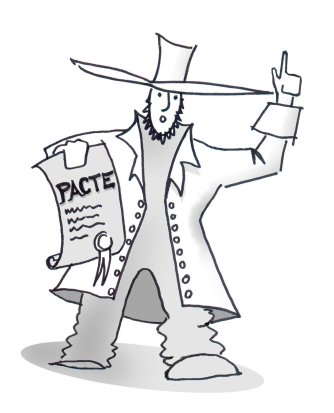From a French webpage written by Lejeune
Philippe Lejeune divides his essay "The Autobiographical Pact" into four section, but I just noticed that the central one is certainly the second section, which takes up nearly half of this essay. This section, called "I, the Undersigned," is a series of analyses and larger reflections that generally illustrate how to distinguish autobiography from fiction, as well as what is at stake in the effort to make this distinction.
Lejeune's discussion of the different kinds of texts in which the first person "I" is applied by the narrator brings up some problems that are difficult to settle -- for example, when somebody says "I was born..." doesn't the "I" in that sentence function ambiguously to refer to both the baby, the subject of the sentence, and the speaker of the sentence? Lejeune guesses there could conceivably be a problem of communication in situations when the subject of the sentence and the speaker are presumed to be the same but not really the same.
After discussing this awhile, Lejeune concludes that to identify the speaker of "I" in written texts, we need to know this narrator's name. If the narrator's name is the name of the author, then this is autobiographical writing, or what Lejeune calls "personal writing."
Somewhere in the text -- the cover page, say -- there is some proper name associated with the author. Somewhere else in the text -- near the beginning, say -- there is some name associated with the narrator. If these two names are the same, we have an autobiography. This is the "autobiographical pact." On the French webpage mentioned above, we have:
Qu'est-ce que le pacte autobiographique ?
...Enfin très souvent le pacte autobiographique entraîne l'identité de nom entre l'auteur dont le nom est sur la couverture, et le narrateur-personnage qui raconte son histoire dans le texte.
Of course, I don't like the look of that "Enfin très souvent" very much. If this identification only happens most of the time, then some of the time you might not have it and yet still have yourself an autobiography. More to come, my brain can only take so much at once...
On the other hand, if the narrator's name is not the author's name, then we may have autobiographical fiction on our hands, or else just plain old fiction. But certainly not autobiographical writing. (Unless an exception to this rule also occurs. Mon dieu!)
After reading this section, it is hard to say whether this is a simple point, or a profound one. Consider three reflections that Lejeune supplies at the end of this section:
Autobiography is a literary genre which, by its very content, best marks the confusion of author and person, confusion on which is founded the whole practice and problematic of Western literature since the end of the eighteenth century.
If there is no one outside of language, since language is other people, we would have to arrive at the idea that autobiographical discourse, far from referring, as each person imagines it, to the "I" minted in a series of proper names, would be, on the contrary, an alienated discourse, a mythological voice by which we would all be controlled.
When we try, then, to distinguish fiction from autobiography, to determine what it is that the "I" refers to in personal accounts, there is no need to go back to an impossible world-beyond-the-text; the text itself offers this last word at the very end, the proper name of the author, which is both textual and unquestionably referential.

No comments:
Post a Comment